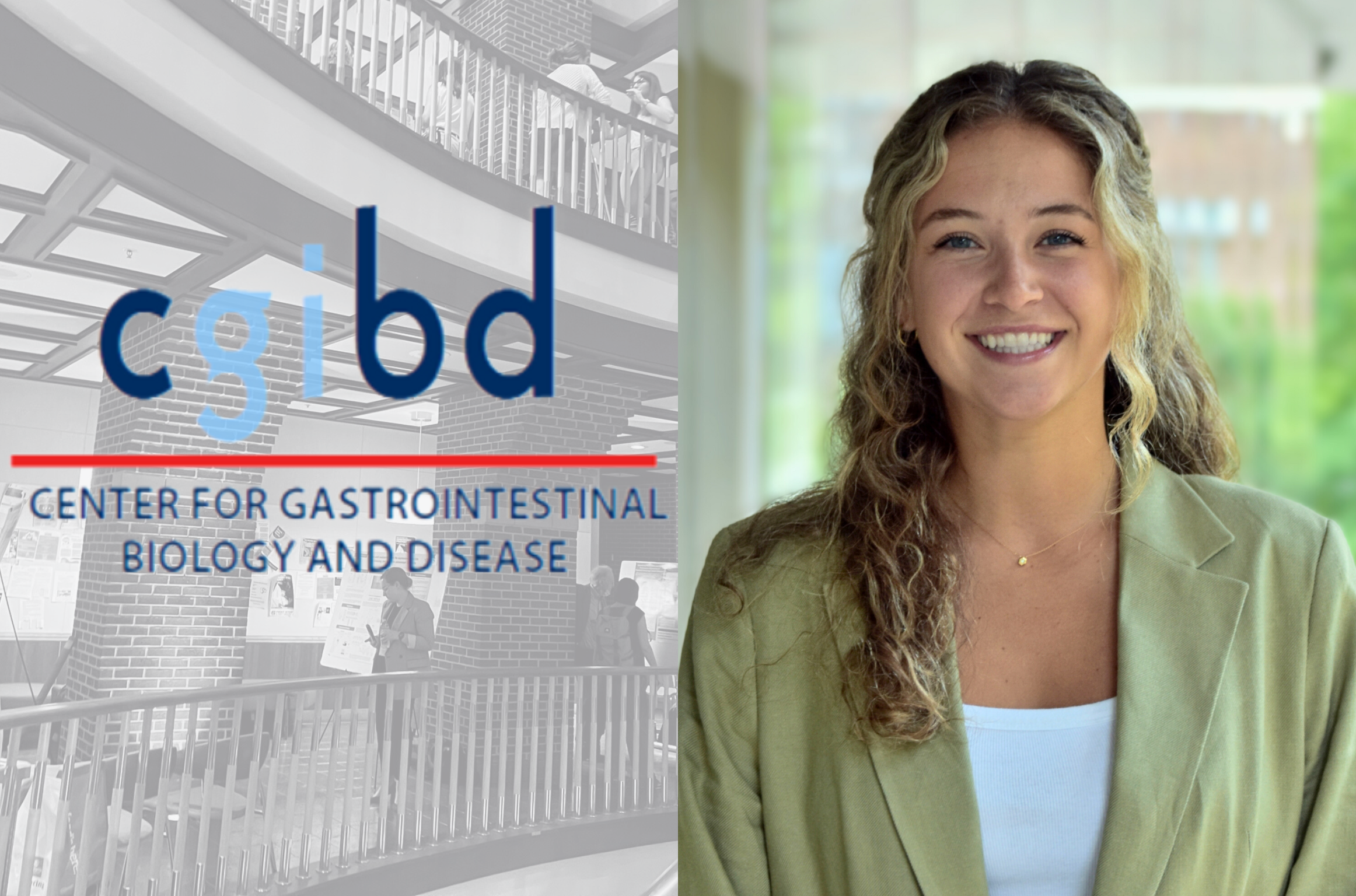Kylie Reed Wins 2024 CGIBD Research Competition
In late October, Postdoctoral Fellow Kylie Reed was named the winner of the Center for Gastrointestinal Biology and Disease’s 2024 Research Competition.
Reed, who began her postdoctoral fellowship through CGIBD earlier this year, is working under the joint mentorship of Lawrence David of Duke University and Ian Carroll of UNC-Chapel Hill. Her research centers around the role of the microbiome in eating disorders, specifically anorexia nervosa (AN), which has been linked to numerous medical complications. At the CGIBD Research Competition, Reed focused specifically on the role of the gut microbiota and intestinal function in nutrient absorption before and following clinical renourishment.
“When an individual restricts their food intake, they also restrict their resident microbes, and we know from other studies in various populations that starvation induces distinct changes to the GI environment. We believe that a dysfunctional gut and disruptions to its corresponding microbial ecosystem are likely key contributors to AN development, perpetuation, and relapse,” she says. “Given that the gut microbiota plays a role in weight, energy absorption, and psychiatric outcomes, our gut microbial communities may serve as a modifiable target to improve outcomes for individuals with AN.”
The current standard of care for AN still leaves much to be desired, which has led researchers, like Reed, to investigate physiological factors underlying the disorder, including metabolism, genetics, and the gastrointestinal environment. Patients in treatment for AN struggle to gain weight even though they may consume more than 3,000 kilocalories per day during renourishment. This disconnect has long been attributed to the metabolic spike that occurs when energy-dense foods are reintroduced into the diet, leading to an overactive metabolism that doesn’t easily store energy and/or induce weight gain.
Reed’s research suggests there are other factors at play. Comparing the energy content of stool samples from individuals with AN and from people without an eating disorder (ED) revealed that individuals with AN had much higher energy-density levels in their stool compared to the non-ED participants. In other words, the individuals with AN struggled to gain weight in part because their bodies weren’t able to properly absorb the food.
“We’re really excited by these findings because they provide an alternative hypothesis, backed by empirical evidence, that could also be driving distressing and uncomfortable weight-gain resistance, independent from or in addition to a metabolic spike. In a disease in which food is the main medicine, we believe the gut is of utmost importance,” Reed says, adding that she thinks this unconventional approach resonated with the competition judges. “In my opinion, the results I presented are a beautiful example of the benefits of challenging any assumptions or biases that we may carry with us as scientists/clinical providers.”
Two weeks after the CGIBD Research Competition, the results Reed had presented were accepted for publication in the International Journal of Eating Disorders. A review by Reed and her collaborators challenging the hypermetabolism bias also appeared in the Journal of Eating Disorders in May.
The field of participants was especially competitive this year. Of the initial applicants, only 12 were selected to participate in the poster session. The call for abstracts was open to postdocs, graduate students, and undergraduates so long as the applicant was mentored by a CGIBD member. In terms of subject-matter, the only requirement was that the topic be related to digestive disease research. As a result, the presentations ranged from distinguishing protective and non-protective species of bacteria in C. diff infections to understanding the role of endocrine cells in the intestinal-absorption barrier.
Reed was especially excited to learn about the research of Anna Salvador, a CGIBD postdoc who studies the role of dietary oxalate in Inflammatory Bowel Disease. “She’s a research scientist but also a practicing dietitian, and she’s been able to take her anecdotal observations from her patients about certain ‘trigger foods’ and identify an actual biological mechanism that may be driving it,” she says. Like Salvador, Reed is exploring how to leverage diet as a means to improve patient outcome.
“One of the main drivers behind my research is my desire to reduce the stigma associated with eating disorders. By uncovering more about the biology lying beneath the surface, I aim to help dissolve misplaced or misinformed stereotypes about EDs,” she says. “It is important to advocate for individuals affected by these disorders, especially within the medical community that may have previously underplayed their biological complexities, and I’m grateful to CGIBD in recognizing the importance of this line of research.”
Reed plans to use the $1,000 endowment she received from CGIBD to travel to the International Conference on Eating Disorders in May 2025, where she would present these findings. As her research continues, she will utilize FoodSeq—a DNA metabarcoding process developed at the David Lab—to study the impact of severe caloric restriction on the gut and eventually shape a more effective treatment for anorexia nervosa.

